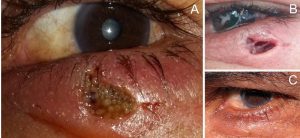It might sound like something out of a thriller, but Myiasis—a real medical condition involving fly larvae in the human body—is more common than you’d think in certain environments. Unlike ordinary houseflies, some species lay eggs on skin or wounds, and once the larvae hatch, they can penetrate soft tissue and cause serious health problems if not addressed.
So how do they get in? Why do they choose you? And what can you do to stop this absolute nightmare from happening? Let’s break it down.
What Is Myiasis and How Do Maggots End Up Living Inside Humans?
Myiasis happens when certain types of fly larvae (Dermatobia hominis, Chrysomya bezziana, and others) invade and grow inside human or animal tissue. While most flies are content with trash and leftovers, these guys lay their eggs on open wounds, spoiled food, or even directly onto your clothes or skin. Once the eggs hatch, the larvae burrow in—and boom, you’re officially hosting a parasitic infestation.
These larvae don’t just exist in the body—they actively feed and grow, often causing swelling, discomfort, and persistent skin lesions. If left untreated, the damage can become severe or even lead to long-term complications.
How Do People Get Infected?
Myiasis can affect anyone, not just those in isolated or extreme environments. Here are some common ways people become exposed:
- Consuming food contaminated by fly eggs
- Leaving wounds uncovered in areas with many insects
- Traveling to tropical or subtropical regions without insect precautions
- Wearing clothes or using bedding that has been left outdoors where flies may lay eggs
In short, if you’re in a fly-prone environment and don’t take preventive measures, the risk increases.

Signs You Might Have Flesh-Eat1.ng Maggots in Your Body
Although the symptoms can be uncomfortable to think about, recognizing them early is crucial. Depending on the site of infection, signs may include:
-
Persistent skin sores or lesions with a small central opening
-
A strange sensation or movement beneath the skin
-
Localized pain, swelling, or signs of tissue irritation
-
Unusual discharge from a wound
-
In the ear: discomfort, reduced hearing, or buzzing sensations
-
In the eye: redness, irritation, or blurred vision
-
In rare gastrointestinal cases: nausea, digestive discomfort
-
In the genital area: irritation or abnormal discharge
Severe infections can lead to more complex complications if not addressed by a healthcare provider.
How Is Myiasis Diagnosed?
In some cases, diagnosis can be made by direct observation of larvae in a wound. When not immediately visible, doctors may use:
-
Blood tests to assess for signs of infection
-
Imaging tools such as ultrasound or MRI for deeper tissue involvement
-
Microscopic or genetic testing to identify the species
A small skin opening, often referred to as a “breathing hole,” is a typical sign that helps clinicians confirm the presence of larvae.

Treatment: How Do You Get Maggots Out of the Body?
Treatment typically involves removing the larvae safely and preventing further complications. Common approaches include:
-
Applying occlusive substances (e.g., petroleum jelly) to cut off the larva’s oxygen supply
-
Carefully extracting the larvae using sterile tools
-
Cleaning the affected area and applying proper wound care
-
Administering antibiotics if there’s any sign of infection
-
In some cases, medications like ivermectin may be used
-
For deep or internal infestations, surgical procedures might be necessary
Important: Always seek medical attention. Self-removal can increase the risk of infection or incomplete extraction.
How to Prevent Myiasis – Because No One Wants Maggots in Their Body
The good news is Myiasis can be completely prevented with proper precautions:
-
Maintain good hygiene
-
Keep wounds covered and clean
-
Store food properly and avoid eating anything exposed to insects
-
Use insect repellent and sleep under mosquito nets in high-risk areas
-
Avoid wearing clothes left outdoors overnight
-
Travelers to tropical regions should take additional protective measures
Staying informed and cautious can go a long way in preventing this condition.


